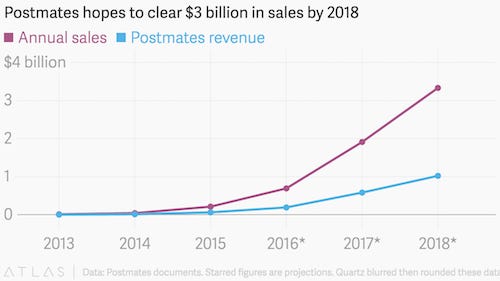A self-driving Uber crashes, Postmates cuts staff, and China’s Mobike pays its users to take rides
LI
Incidents.
Here is a #hottake: What if we really are living in a computer simulation, and the person holding the controls is out to get Uber? I’m joking, of course, but you could almost forgive someone at Uber for thinking that. The company seems increasingly unable to extricate itself from a vortex of scandals and crises. Last Tuesday (March 21), Uber lined up four of its top women to reassure people that it had everything under control. “The business remains healthy,” said Rachel Holt, Uber’s business head for the US and Canada. “Last week, riders in the US took more trips with Uber than ever before.” Travis Kalanick met with Jesse Jackson and promised to make diversity a “top priority.” Uber is scheduled to release its first-ever diversity report this week.
Meanwhile, Bloomberg reported that Uber’s recruiting team had long been denied access to information on diversity at the company. Recode detailed the “civil war” that has broken out in Uber’s self-driving car division. Gabi Holzwarth, Kalanick’s ex, told The Information about the time Kalanick and five other Uber employees visited an escort-karaoke bar in Seoul. On top of all that, a self-driving Uber was involved in a high-impact crash on Friday (March 24) that caused it to flip over, and left another vehicle badly dented. There were two safety drivers in the Uber but no passengers, and no one was injured. Uber’s car, which was in autonomous mode at the time, was found not to be at fault by local police in Tempe, Arizona.
It says something about Uber’s current state of affairs that the crash was the easiest problem to handle. The company briefly suspended tests of self-driving cars while it investigated what happened. Uber’s driverless cars were back on public roads in Tempe, Pittsburgh, and San Francisco by yesterday afternoon. It was a good remember of what Uber does best: handling one-off logistical problems. The company got as big as it did by coasting through political and regulatory challenges in governments around the world. It’s the thornier internal challenges that Uber never learned to address. “Let’s keep jamming on this,” Kalanick would reportedly say, when recruiters raised diversity as a concern. Jam time is up now.
Trump Tower.
Here is a story about Lena Yelagina, an Airbnb host done in by her own accidental fame. For at least the last six months, Yelagina had rented out her 30th-floor apartment in Midtown Manhattan for between $300 and $450 a night. In New York, it's been illegal to rent an entire apartment for less than 30 days since 2010, but the city has struggled to enforce the rule. Then, in early March, a reporter for the New York Times realized that Yelagina's listing—“very cozy,” “great lighting,” “you have to go through a check by the Secret Service”—was actually in Trump Tower. The Airbnb listing became the subject of a Times feature, complete with screenshots and interviews with previous guests.
Unfortunately for Yelagina, that was also all the evidence the city needed to prosecute her under the law New York state governor Andrew Cuomo signed last October, making it illegal to even advertise the rental of an entire apartment for less than 30 days. City officials have since issued Yelagina a summons and $1,000 fine (the penalty for a first-time rule breaker), though she reportedly wasn’t easy to track down:
The city tried to serve her a summons at the beginning of March, but no one answered at her Trump Tower apartment. A week later they went back and again found no answer at her apartment.
The inspector wrote in the affidavit that the concierge, a Russian woman, told him that Ms. Yelagina has owned the apartment for 15 years.
They then tried to find Ms. Yelagina at a flower shop that public records indicate she owns nearby, but were unable to find her. Finally, the inspector served the summons by leaving it with a doorman at Trump Tower and by mailing it to Ms. Yelagina’s apartment.
Yelagina’s listing is no longer available on Airbnb, and her hearing is scheduled for May 4. “We will continue to crack down on those who profit by turning permanent housing into de facto hotel rooms,” says Melissa Grace, a spokeswoman for Mayor Bill de Blasio. New York typically cares less about people like Yelagina who occasionally rent out a single unit than landlords who run large-scale rental operations online—so called “illegal hoteliers.” The moral of this story is that if your occasional illegal rental is in Trump Tower and gets written up in the New York Times, the city will probably end up caring about that, too.
Free rides.
There’s no such thing as a free ride, except in the sharing economy, in which case, lol. The current free rides are courtesy of Chinese bike-sharing startup Mobike, which my Quartz coworker Josh Horwitz reports has started paying users to take trips. Mobike, a sort of “Uber for bikes,” owns and scatters thousands of bikes around Chinese cities, then charges people a small time-based fee to ride them. The problem is that customers often ride to and park the bikes in remote locations, effectively side-lining a portion of Mobike’s inventory. The company is now attempting to fix that by offering credits and cash rewards to users who find and ride bikes left in isolated areas:
Typically, when a user opens Mobike’s app, they’ll see a map of all the bikes parked in the vicinity. As of last week, Mobike has begun designating some vehicles “bonus bikes,” labeled with a red envelope. According to Mobike, users who hop on these bikes and ride them for at least ten minutes will be eligible to receive a cash gift worth between 1 yuan and 100 yuan (between $0.15 $14.55). That minimum gift is already higher than the price of a 30-minute ride on Mobike’s “discount” tier Mobike Lite.
While Uber never shied away from discounts and sign-up bonuses, Mobike is really breaking new ground with this we-pay-you-to-use-our-product strategy. On the other hand, you can also see how paying users a small fee to relocate bikes to more convenient locations might be cheaper than hiring employees and dispatching them to faraway parking spots in cities around the country to do the same thing. I feel like the real hack would be to ride to and park a Mobike in a remote location, then pick it up the next day and cash in for bringing it somewhere more convenient. It would be a great commuting strategy, if you had the right setup.
Layoffs.
Postmates has laid off dozens of people, including multiple “community managers,” BuzzFeed reported last week. The cuts, about 30 jobs in total, were made as part of a “redefinition” to “fuel our continued growth and efficiency,” SVP of operations Russell Cook said in an emailed statement. “While we’re hiring for positions across the markets in which we operate, part of this redefinition includes the difficult decision to phase out our community manager position,” Cook said. Postmates raised $140 million in funding at a flat valuation last October, an effort that took the better part of a year. (“Flat is the new up,” Postmates CEO Bastian Lehmann joked at the time.) The startup has since claimed to reach a $1 billion annualized revenue run rate and said it will be profitable by late 2017 or early 2018.
I’m not holding my breath, as this is the third profitability target Lehmann has set in less than two years (it was 2016, then 2017, and now 2018). Postmates also needs to pull off a small miracle to make those numbers work. As I reported last December, the startup told investors it would hit $2 billion in annual sales in 2017 and clear $3 billion in 2018 to bring its accounts into the black (see chart above). Postmates lost $47 million before interest and tax in 2015 on revenue of $52 million; it expected to lose nearly $60 million in 2016 even as revenue approached $200 million. Combine those figures with the recent layoffs, and something in the company’s optimism just doesn’t add up.
Other stuff.
Is the Era of Cheap Uber Rides Over? It’s Illegal for Uber Drivers to Accept Tips in Some States. Peter Thiel and Max Levchin bet on the gig economy. China’s Consumers Hate Airbnb’s New Name So Much They Are Brainstorming a New One. Didi weighs $6 billion investment from Softbank. Costco expands grocery delivery with Shipt. Peapod’s Quiet Quest to Win the On-Demand Food Fight. Austin-based Dropoff takes aim at FedEx. Instacart settles class-action lawsuit with shoppers for $4.6 million. Lyft reaches $2 million in driver tips. Omniscient Uber GM Josh Mohrer Hails Down $3.85 Million Lincoln Square Co-op. Uber tests new commute option in D.C. Theranos Offers Shares for Promise Not to Sue. Hop on a Boat Anywhere. How to short Uber. “If we wanted to be profitable, we could be profitable tomorrow,” Grab CEO says.





